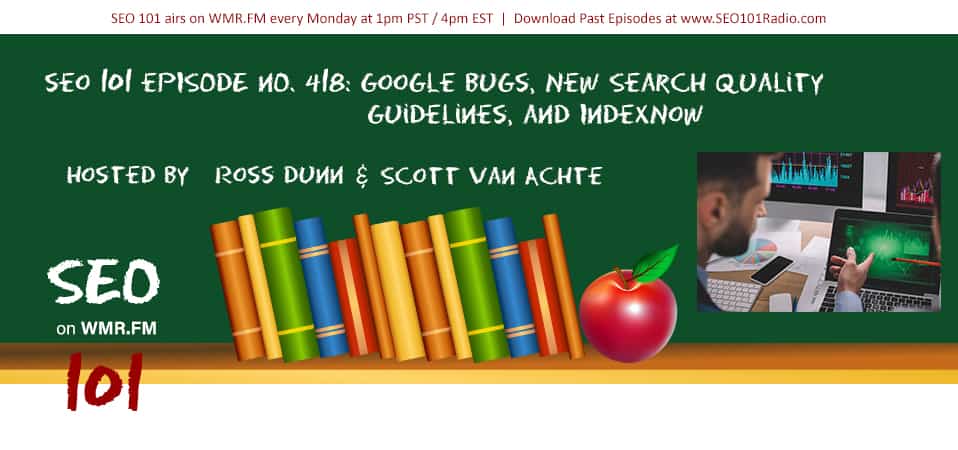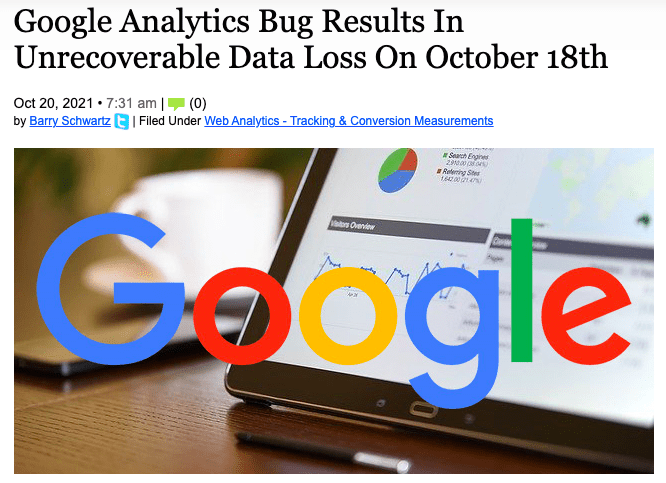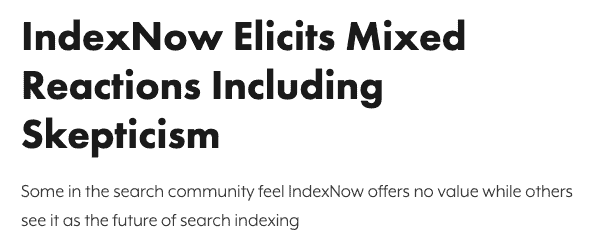The hosts start the show discussing Google’s permanent loss of analytics data and a breakdown of Google Alerts. They then dig into the changes found in the latest update to Google’s Search Quality Guidelines, the impact of mobile continuous scroll, the questionable benefits of IndexNow from Bing and Yandex, and much more.
Noteworthy links from this episode:
- Google Analytics Bug Results In Unrecoverable Data Loss On October 18th
- Google Alerts Stopped Working For Several Days For Some (Now Fixed)
- Google search quality guidelines update expand YMYL category, defines lowest quality content and more
- Google rolling out continuous scroll on mobile
- IndexNow Elicits Mixed Reactions Including Skepticism
Transcription of Episode 418
Ross: Hello and welcome to SEO 101 on WMR.FM episode number 418. This is Ross Dunn, CEO of StepForth Web Marketing and my co-host is my company’s senior SEO, Scott Van Achte.
Another fantastic day.
Scott: Yeah, good afternoon! 418, wow that number just keeps on growing!
Ross: Yes, and onward it will continue. It’s kind of mind blowing. I was actually just in a search engine panel a moment ago on Zoom. Everyone’s always amazed that we [StepForth Web Marketing] have been around since 1997. It doesn’t seem like anything until I really think about it, that’s a long time. I can’t kind of get over it.
Anyway, let’s jump into some non-SEO news that you put in here first. Why don’t you take the first one?
Scott: Yeah, you bet. This should almost be called the bug report. I feel like every week, we’ve got at least one Google bug that we want to talk about and today, I’ve got a couple. They’re not super major but good to note. On October 18, for about an hour, Google Analytics resulted in a complete loss of data collection.
If you see your traffic drop, the data loss was between 7:27am and 8:30am Pacific Time on the 18th. If that’s a heavy traffic time for you, early in the morning, your stats are going to be looking a little thin. Don’t freak out. First of all, that data is unrecoverable, according to Google, so there’s nothing you can do about it. The general recommendation is to make an annotation in your Google Analytics account on that day, just noting that, so if you come back in the future and you’re trying to compare October 18, 2022 with this year, at least you’ll have an idea why the numbers may not make a lot of sense.
Ross: Someone got in trouble for taking their tea into the server room.
Scott: Oh, yeah. There’s some coffee spilled on a keyboard or something, I don’t know. Who knows what caused that. It’s weird. Just one hour of data loss and why something went down.
Ross: Who knows? Maybe they wanted some extra power for gaming.
Scott: Yeah, exactly, right? Something went on. At around the same time, actually for about five or six days, resolved on October 20, Google Alerts stopped working, which is also now fixed. 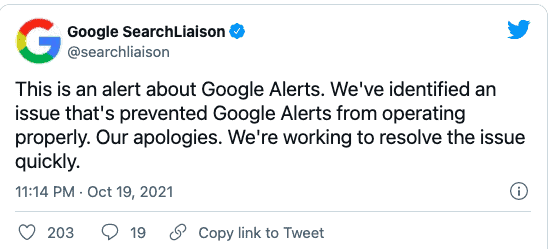
Ross: It does. Yeah, I guess when you get that big, little things can add up.
Let’s jump into some SEO news. The Google search quality guidelines have been updated to expand on the Your Money or Your Life category. It also defines the lowest quality content a bit better. What these are essentially: Google has created search quality guidelines that they provide to human reviewers of search results. They have a team (who knows how big) that they use just to monitor, test, and provide feedback to Google’s main algorithm on what it’s doing right or wrong. It does not mean that this is a ranking change. You don’t go by this like the Bible but what it does do is it provides some perspective on what Google considers content worthy of ranking. Just a few elements here:
- They expanded the definition of the Your Money or Your Life subcategory, which is Groups of People. In that sense, to quote on here, “Groups of People subcategory is the information about or claims related to groups of people including but not limited to those grouped on the basis of age, caste, disability, ethnicity, gender identity and expression, immigration status, nationality, race, religion, sex, gender, sexual orientation, veteran status, victims of major violent event and their kin or any other characteristic that is associated with systemic discrimination or marginalization.” This is just a way to delineate that type of Your Money or Your Life content that Google’s really hard on. If you have any sites that are focused on this kind of thing, they tend to get beat up pretty good on these updates.
- They refreshed the guidance on how to research reputation information for websites and content recruiters. I haven’t personally seen that and might be interested to look at. It’s not something that’s been highlighted in the reviews I’ve looked at but it does sound interesting.
- They’ve restructured and updated the Lowest Page Quality section, reorganized and refreshed examples to reflect the new structure.
- They simplified the definition of “Upsetting – Offensive” to remove redundancy with the Lowest Page Quality section. This is interesting, I said “upsetting – offensive, what does that mean?” I looked that up and essentially…when their people are looking at this content, they’re actually able to tag the search result with “upsetting or offensive.” Typically, this is information like…examples they used was one with a holocaust denier. Well, this is upsetting or offensive. Click, definitely, no question. Then they write a little thing on why. If they even do the write up, I don’t know maybe that’s just part of the example. They essentially click on that and they can then go to another one, which is a Wikipedia on the Holocaust. Obviously that’s not upsetting or offensive, it’s just facts so they leave that and it’s not upsetting or offensive. This is just part of their tagging strategy as they’re going through so they can weed out issues. Anyways, I guess there was some confusion or redundancy with Lowest Page Quality but upsetting or offensive seems pretty clear to me, much different than the Lower Page Quality.
- There are minor changes throughout (updated screenshots, URLs, wording, examples for consistency, remove outdated examples, etc.)
I’m reading this thanks to Barry Schwartz on Search Engine Land, his article. Ultimately, it was over 1000 content changes that he “counted.” I don’t know if he actually counted it or not but it’s impressive if he did, he probably did, this is Barry, he’s very thorough. The largest section updated was the Groups of People section and the section on Lowest Quality Content. Again, just a glimpse at how Google is thinking: lowest quality content, they’re always focused on providing the absolute best experience they can to users, so they’ll keep coming back. They want to eliminate that low quality content. They don’t want it to appear and anything that squeaks through is hopefully gonna be caught by the quality raters and their algorithm will improve and catch them the next time around.
Scott: This is some nice light reading there. I just posted it and it should be in the show notes — 172-page PDF about all of this. If you’ve got about two or three pots of coffee that you’re looking forward to drinking, now is the time. Load up the pdf then.
Ross: Yeah, and it’s down from 175 pages last year, so they’ve tightened it up.
Scott: Oh, think of all the time we can save.
Ross: Yeah, definitely. That’s a whole ‘nother pot of coffee.
Scott: Okay, four pots it is. No problem.
Ross: Yeah, and also Google rolled out continuous scroll on mobile. 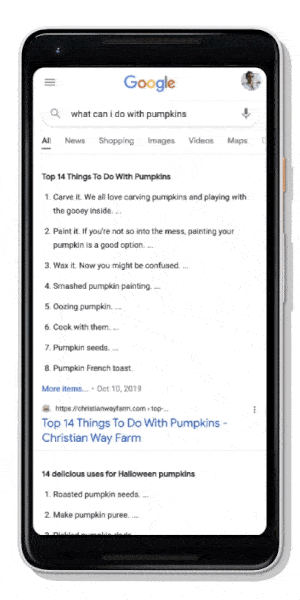
Scott: Sometimes it’s even just the top 2. Sometimes you’re working and it’s just all the other stuff, and the organic results are few and far between depending what you’re searching for.
Ross: Yeah, and especially when they start throwing in snippets and all that stuff that can take a huge chunk off a page. You mentioned on here that it’s rolled out to most users in the US, as I thought. I was like “I’ve seen this before” When were these last tested?
Scott: They’ve tested this a bunch of times in the past in 2011, 2015, 2019, and then even earlier this year, they’ve given it a test. I just want to point out that as of five minutes ago, it’s still not working on my phone up in Canada. Maybe I’ll get it someday too, I don’t know, we’ll see.
Ross: There doesn’t seem like a huge need for it but it is interesting. It is mobile only so all those people who are looking at their desktop saying, “I don’t see it.” Again, it’s only mobile. What does it mean for us as marketers? Not a whole lot, really, you still want to get the most exposure you can so moving up is a good thing. That just happens through earning the right to rank and by getting lots of authority, creating phenomenal content, making your site easily indexable and creating the focus where it should be on the best content you have and your best products or services — honing it through internal links, you know, the easy small stuff, I’m just scratching the surface.
Scott: Whenever Google does any kind of update like this, I always sort of try to find the bad in it, right? In this case, I can only really see good because (I don’t know, maybe I’m wrong) I can’t find any downside to infinite scroll, or as Google’s calling it “continuous scroll.” If you’re a user, you don’t have to act, you just keep scrolling. If you’re a website owner, it blurs the line between page one and page two, it’s just there isn’t a line anymore. If you were in the olden days (yesterday), at the top of page two, now you’re just in the mix. I would think maybe it’s more likely that if you were previously on top of page two ranking, you’re maybe more likely to be clicked on now. Although maybe the act of clicking on page two and then having you pop up at the top, maybe that increases click rate. I don’t know, it’s hard to say but I feel like it’s probably a good thing across the board here, probably.
Ross: And I think mobile is extremely lucrative from an ad perspective and having this continuous scroll is probably going to give them more opportunities to add ad links within the result. That’s something I suspect we’re going to see more of. Typically scattered amongst all the classic organic rankings. We’ll see.
Again, it’s always interesting – the stuff I get out of these panels I’m in. Someone asked, he said he really doubted that SEO had as much of a benefit these days because social media seems to be taking the forefront of everything, is there really much point in focusing on your website or even having one? Well, this came up and I’m glad the person asked because it is something that comes up occasionally and if you’re ever in doubt, let’s say you’re in a really social-focused market, like for example, I’ve been fairly active in the interior design community. They’re huge on places like Houzz, on Pinterest, on Instagram because they’re very visual, the work they do and they would be remiss not to use these social platforms. However, I can’t imagine an example where I would be comfortable ever putting all my eggs in those baskets and not having a place that I could call “home” that I own, that I can control. Just as an example, there was a downtime recently on Facebook and Instagram. Well, people weren’t getting any exposure then and what were you going to do? There’s not much, right? Pretty much your “website” was down, essentially but if you had a website, at least people could go to that. At least, if they were searching for you, perhaps your site would show up instead of your other content on those social platforms. And you know, how Google is a great example, like Google Plus, any product that you invest in, can just disappear overnight. They might give you a few nights or months in notice but what are you gonna do? They’re gonna remove it, you’re screwed. Do not put everything into third-party sites that you don’t own, that you don’t have some ability to maintain if they move forward and they disappear. So just a thought there.
Scott: I want to point out as well that even though the majority of people, I think it’s safe to say, use Facebook, we get really annoyed in our house with that because often, like there are some sushi restaurants in town and their menus are only on their Facebook page. My wife, Lindsay, does not have Facebook. She deleted her account years ago now. If you try to load up that menu on Facebook, without an account, on your phone especially, half your screen is now dedicated to Facebook telling you to sign in and create an account and you get this tiny little window of a menu that you’re trying to read. It’s basically impossible. Even if the numbers aren’t the majority, without having a website, you are devoting everything to Facebook. You’re alienating part of your potential customer base. Even the super basic simple website with a menu in that case for a restaurant, I feel is critical.
Ross: Absolutely. They don’t even have a Google My Business listing that you can focus on?
Scott: Well, there’s one particular sushi place that we like and they have nothing. They have a Facebook page and that’s it, 100% is Facebook and it drives us crazy. Sometimes, we order from other places because of it or what often will happen is Lindsey will come and try to track me down to use my phone, to go onto my Facebook account so she can look at the menu but that’s ridiculous to have to do that.
Ross: Yeah. I just shake my head, I just don’t get it. Many of them don’t even offer any kind of online anything. If you want to stick to the old style, I guess I can respect that but then you only have one phone line, you can’t get through. It’s like “Oh my God!”
Scott: “Where’s the Yellow Pages again? Where did we put that? Oh it’s in the recycling bin. Right.”
Ross: Exactly. Alright. Well, let’s take a quick break and when we come back, we got some local SEO news and some questions.
Welcome back to SEO 101 on WMR.FM. Hosted by myself, Ross Dunn, CEO of StepForth Web Marketing and my company’s senior SEO, Scott Van Achte.
Before we jump into local SEO news, IndexNow — did we cover it last time? I wish I could remember. My memory is a pit.
Scott: I don’t believe we did.
Ross: Okay, so essentially, Bing and Yandex (Russian search engine) have cooperated to create an API, essentially it’s called just a “protocol” that allows you to get your content indexed as soon as it’s launched. The idea here is when it’s embraced by the system that you’re running your website with, let’s say in this case, Wix. Wix is an example of a company that’s jumped on board. Google doesn’t have to guess and hunt through your site for new content, it will be notified and so will Bing, so will Yandex, so will any other search engine you want to be notified (you can control who gets notified). The idea here is it’s supposed to limit the power that Google needs, so in other words, it’s a little greener by feeding them the content, and it’s up to 10,000 pages per day, which is plenty. The biggest, biggest sites in the world — obviously, it won’t be, but it’s still an amazing start.
It generally was interesting to hear about people who were really excited about it, it was very mixed. Well, that mixed reaction came out interestingly in this article in Search Engine Journal. It’s the mixed signals. While Joost de Valk really stuck his head out on this, he said that the Yoast SEO tool is not going to jump on board and they will not do this. He feels it’s not worthwhile. It’s already being done essentially by having a sitemap — your index sitemap that is automatically generated by the Yoast plugin, it is updated with the latest content. If Google looks at it first thing when they get to the site, it will know immediately where to go. In addition, (I think they said “can” I’m not sure if it’s a setting, I haven’t looked at it in ages) the Yoast SEO plugin can also ping Google and the various platforms when your new content is out. He just says that’s simply all you need. Now, the discussion went on. Of course, there’s always “it depends.” There’s always the “it depends” and someone brought up a point, that he even agreed that was a proper use of this new tool, would be if you have really large sites. It would be more worthwhile to use a system like that. He says there are implementations for it, but in the sense of his sites, largely less than 100 pages, the sites that use the Yoast SEO tool, it’s a pointless addition so they’re not going to bother. Anyways, interesting to see how something that seems pretty cool, really does get a mixed reaction and I guess we’ll see how well it rolls out.
All right, local SEO news. This is a little point on an issue we had recently. As many know, one of the disciplines at StepForth Web Marketing is that we have a separate group, it is technically a different company, but a separate group of us that focus entirely on dental marketing, first.dentist. 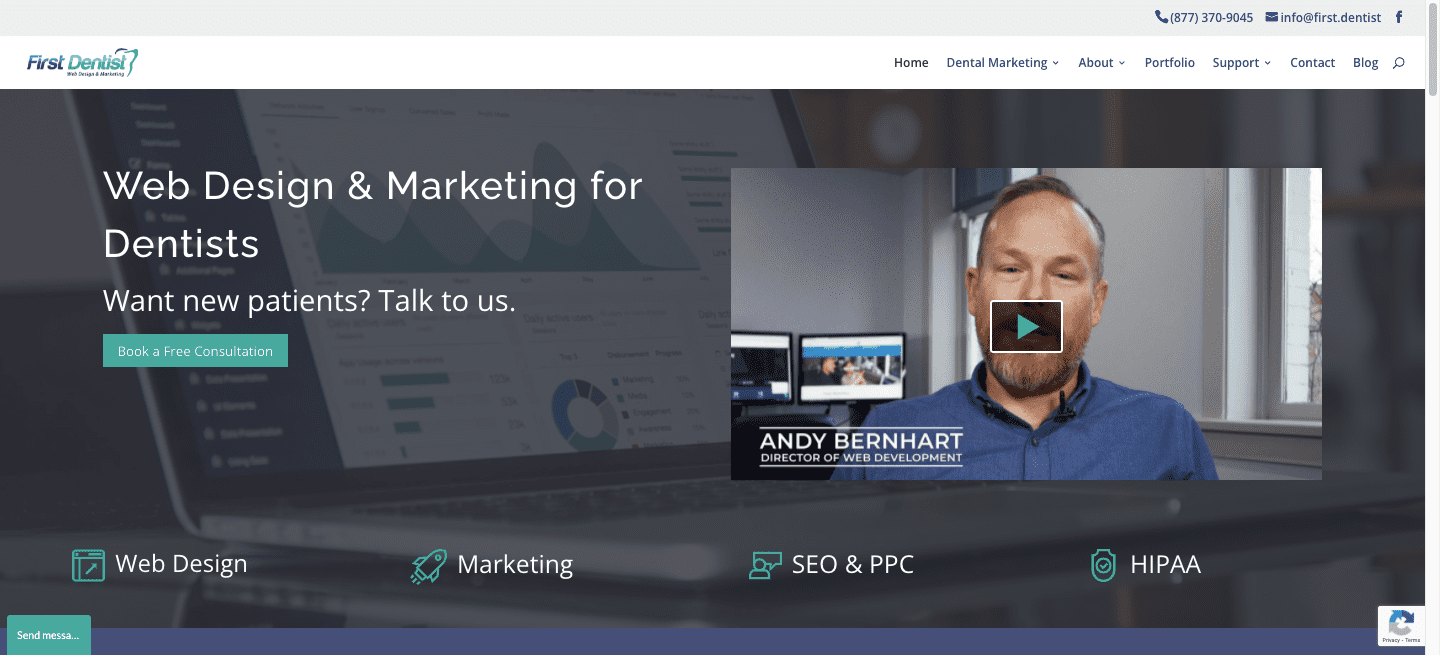
Scott: Oh, beyond frustrating that sort of stuff. We’ve definitely had that kind of thing happen in the SEO world too, where clients go in and they start making a bunch of changes with good intentions, not knowing that they’ve caused…Luckily, most are pretty perceptive once we figure out what’s going on but sometimes, you might see a ranking just plummet and you’re like “what’s going on?” Then the client freaks out “what’s happening here?” and you’re like, “I don’t know” and then you dig in and find out that they actually broke it. If you’re paying somebody for professional service, I don’t care if it’s SEO or your lawyer or your doctor, or anybody, before you make something that could possibly contradict the expert advice you’re paying for, maybe check in on the expert and don’t just jump ahead and do it. A thought anyways, maybe I’m crazy that way.
Ross: Well, yeah, I mean, you’ve invested in a company, definitely run it by them. If they don’t have a good response, well, that’s another thing, they’re obviously messing about. No question whatsoever, we were on top of it. It’s almost a smack. It’s like “what but I didn’t do anything wrong. We were doing everything right. I followed everything by the rulebook.” Anyway, it happens, 24 years of this so things like this happen, right?
Scott: Can’t stress it.
Ross: Yep. So, our good friend Michael Linehan sent in some questions. I think we’ll do one of them today and do a couple the next time. Just because we’re having an extra long show today. His first question is about blackhat spam. He says “I haven’t received any ‘submit to 150,000 search engines’ or other such rubbish spam for years. Does that stuff even exist today… to warn my clients about?” I haven’t seen that in a long time either. What do you think, Scott?
Scott: It’s been ages since I’ve seen one of those or like the cheap 500 links for a penny or any of that garbage. I just don’t see it anymore.
Ross: Yay!
Scott: It’s got to still exist. There’s no way the scammers would just stop. They’ve moved on to other things.
Ross: I would think that they’re so uninformed — the people that would be doing that. That they’re using probably very uninformed email marketing methods that are being blocked by Google or other spam protection systems because it had to be vastly uninformed, since people are more aware of that by now, as simple as that. I’m sure the return on investment would be miniscule for such work, like just trying to pitch that I mean. I don’t know, what do you think, Scott?
Scott: Yeah, I guess. I don’t think they’d be getting a lot of people biting and paying them any amount of money and that sort of stuff used to be cheap, even the scammers didn’t charge much. It would be $99 and to make the scam worthwhile, I don’t know how many 1000s of people do you really have to rope in. Maybe people are just too savvy nowadays to buy into this crap, which is quite possible.
Ross: Well, we can hope. So for the next question, we will get to it in the next episode. It’s about the length of pages and some SEO factors. Sorry, we couldn’t get to all that today but hey, something to look forward to.
So on behalf of myself, Ross Dunn, CEO of StepForth Web Marketing and my company’s senior SEO, Scott Van Achte, thank you for joining us today. Remember, we have a show notes newsletter you can sign up for at seo101radio.com so you don’t miss a single link and you can refresh your memory of a past show at any time. Have a great week and remember to tune in to future episodes, which airs every week on WMR.FM
Scott: And that’s part of our world. Good night, everybody. Thanks for listening.
